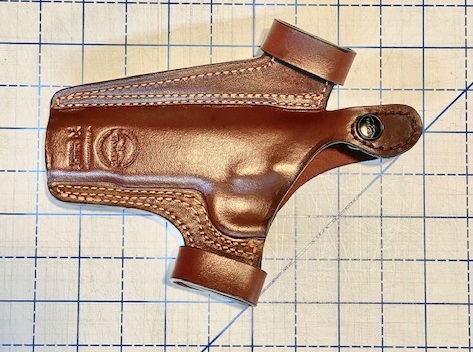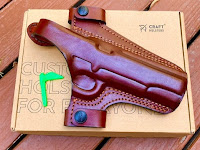Craft Holsters has once again graciously provided a holster for my review. This particular holster is made by Falco, and is listed as the OWB w/ Belt Studs (model It. C108). Craft Holsters offers it for $89 (not including shipping).
As you can see, it is a handsome holster made of leather and available in black or, as I requested, a mahogany brown. You can have it made for right or left hand carry and for many different makes and models of handguns, including revolvers.
I wanted it for a 1911A1, but in addition to the 5-inch length, they also offer it for 3-inch 1911 style pistols. For the 1911, you also have the option to have it made for carrying locked and cocked, which is the option I selected, or regular (which I presume is with the hammer down). It can also be made to accommodate a handgun with an accessory rail.
I requested the holster on or about May 12, 2021. It wasn't in stock, so it had to be manufactured. Nevertheless, I had it sitting on my doorstep on July 1, which is pretty good for a custom holster.
It came via Fed Ex, and was well protected from their harsh treatment by a cardboard box featuring the Craft Holsters logo and information. Inside was a sealed bag from Falco and some extra information and swag from Craft Holsters.
More specifically, it had information concerning Craft Holsters "Holsters Club" which apparently gives you free economy shipping, a loyalty discount, and a 10 year warranty on products ordered by members.
It also came with instructions for breaking in the holster and the thumb strap (including a link to a video), as well as a bit about holster care.
And, finally, some swag: a Craft Holsters sticker to put on your bench, gun safe, or what have you.
I put these aside and opened the plastic bag in which the holster shipped. In this was the holster, of course, and a bright green chamber safety flag with Falco's logo.
Turning to the holster, I found the typical good quality that I've seen with Falco holsters. The leather is standard thickness for holsters, but the color was a rich brown and very evenly applied. The stitching was well executed: even and tight.
You will notice looking at the photographs that the leather on either side of the handgun is double stitched, so there is no worries about that coming undone. The outside edge of the holster is single-stitch, and the edge is so smooth that it is hard to discern where the two leather pieces meet.

Front side of holster (note: each square is 1 inch)

Backside of holster (note: each square is 1 inch)
The outside of the holster is smooth. The interior is rough, which aids in retention. The mold marks are sharp and deep. But the sizing was so accurate that I did not have to break in the holster to get my pistol to fit or to snap shut the retention strap.
The belt loops, as you can see, are also straps that snap shut. The snaps are metal and very tight. The advantage that they provide is that you can unsnap the loops and just pull the holster off your belt without having to undo your belt. They are sized for standard 1.5-inch belts.
I haven't carried my 1911A1 very often, but when I did, I used the pancake holster shown in the photograph. The old holster is not a very good holster really. The leather is soft, so it collapses easily, which can make it challenging to reholster the pistol. 
The holster I'm replacing (left) and the new holster (right)
Also, the leather on the thumb break is not reinforced, and has been used so often, that it has softened even more and curled, making it difficult to unsnap the retention strap. For that reason, I have a special interest in making sure that the thumb break on holsters I get are reinforced with plastic, metal, or additional layers of leather so they will not soften and curl.
Notwithstanding these problems with the old pancake holster, the main reason I liked it was because it held the pistol very tight to my side: a big plus when carrying a heavy steel-framed handgun. And, given the thinness of the 1911 style pistols, it also makes the handgun very concealable notwithstanding the pistol's size.
This new Falco holster, I'm pleased to report, also hugs the firearm very close to the body. I haven't been able to test it out much in the short time I've used it, but I was able to carry a full day to the office, and also out shooting this weekend, and it seems to carry very well. I had a small single magazine pouch that I carried opposite it that helped balance it; a double-pouch would probably work better. But because the holster held the firearm close to the body, it did not cause me as much lower back pain as I've found with other belt holsters for lighter guns.
As for the thumb break, Falco has done it in a way I haven't seen before. Most thumb break holsters will reinforce the strap around where the snap is located with a metal or plastic piece on the backside of the strap, or use extra layers of leather to stiffen it. In this case, however, Falco appears to have split the leather and sandwiched the reinforcing plate between the two halves. It is, of course, stitched around to make sure it stays in place and repair the split. It is a clever idea, and I will be interested in how it holds up over time.
Carrying the firearm around is only half of what a holster is supposed to do. It is also supposed to provide ready access to draw the firearm and reholster it. So a couple comments on drawing and reholstering.
First, because of the angle of the holster, I discovered that it was basically impossible for me to draw the handgun with the holster at a 3 o'clock position because I couldn't get the leverage to overcome the friction from the rough leather in the holster and how high was my arm. I would note that I tend to wear my belt high--pretty much at waist level--rather than around the hips. Perhaps if I was wearing it lower it would have worked better. As it was, I discovered that this is a holster that really needs to be carried at the 5 o'clock position. But, once in the correct place on the belt, it was easy to draw.
Second, I was having problems with reholstering the pistol. I want to make clear that the holster was not collapsing--the leather was too stiff for that. Part of the issue was just trying to get my cover garment--a loose Hawaiian style shirt--out of the way. I suspect that a covering garment that was open on the front, such as a jacket, vest, or unbuttoned shirt, would work better. Part of the issue, I believe, was that the length of the slide was making it awkward to maneuver the pistol into the holster. It makes a big difference on reholstering into a thumb break holster if you can use your trigger finger to help guide the pistol home and keep the strap out of the way. Part of the issue was just not having enough experience with using the holster. And part, I believe, was that how tightly the holster rode to the body also made it harder to get the pistol inserted. This is definitely something I will have to practice.
In conclusion, this is a very good looking, well crafted holster. It is an excellent choice for carrying a 1911 style pistol because it keeps the pistol tight against the body which not only conceals the weapon better, but makes it less fatiguing to carry. I really like having belt loops that can be unsnapped to remove the holster without having to remove my belt and suspenders. For my pistol and how I wear it, I will need to practice reholstering more than just the little bit I was able to do before writing this review.
Links:
- Craft Holsters' main page.
- The Falco OWB Waistband Holster reviewed herein.
- Other holsters for 1911s at Craft Holsters in case you are interested in a different style or something to fit a length other than 3-inch or 5-inch.
 |
| The color of the holster goes together really well with the grip panels on my friend's Kimber. |




No comments:
Post a Comment